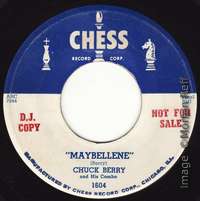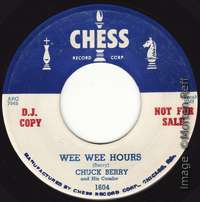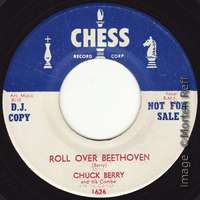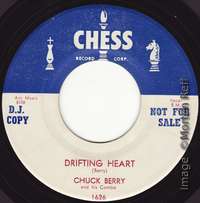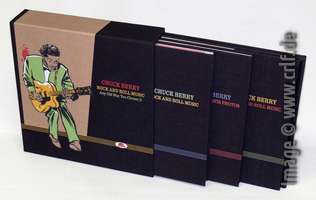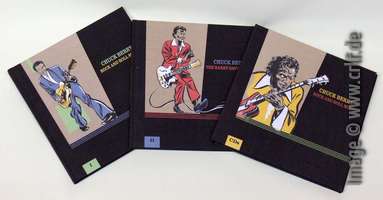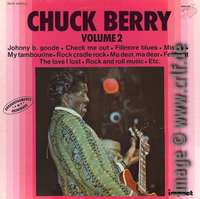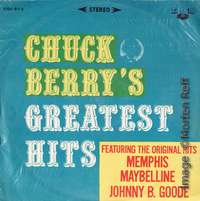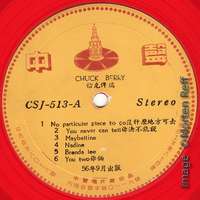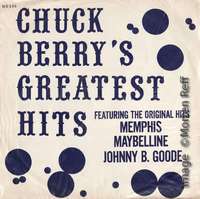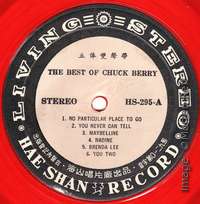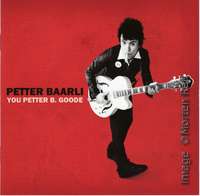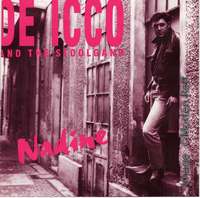Thursday, February 5. 2015
CBID - How Chess DJ Copies look like
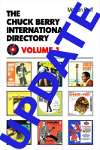
CBID is never complete as new records and CDs appear and some old rarities are discovered. This section presents interesting additions and corrections to CBID.
Today: Some rare images of Not-for-resale records
CBID not only lists, but also shows many of the most interesting Chuck Berry records. Here are the labels of two very interesting records: DJ copies of early Chess releases.
CHESS 1604
CHESS 1626
Thursday, January 22. 2015
New And Verified Information About Chuck Berry's 1950's Recording Sessions
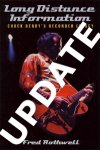
The earlier information has been built up over the years from various publications. For instance the session which created Roll Over Beethoven has for many years been placed in February 1956. I think this was stated first in an early edition of Blues Records. This date was then subsequently used in the discography on the sleeve of Golden Decade Vol 2. as well as in the books by Howard DeWitt and Michel Ruppli. Chuck's discography in his autobiography listed the recording date as April 16, 1956, though. This is what I used in Long Distance Information: Chuck Berry's Recorded Legacy (Music Mentor Books, 2001). On the recording contract the date is stated as April 19, 1956 and I feel this is the most reliable info we have.
Likewise a lot of information about personnel has built up over the years. Blues fans would ask artists about old sessions and I'm sure some guys like Willie Dixon would try to placate fans by giving info that was not always correct. Lafayette Leake was a big friend of Willie's and I suspect he got named as pianist for wont of someone else at times. Johnnie Johnson was not part of the Chess studio clique (he never recorded in his own name at Chess) and I think he may have been overlooked. The contract information now gives us some more reliable data as the contracts list names, instruments and the local musicians union code the musicians were assigned to. The recording of the names is a bit haphazard and it seems like they are phonic interpretations of names (Odie for Otis; Thompson for Thomas etc.). But remember Chess had far more interest in making a hit record than recording musicians names.
All the musicians named on the RoB session (except Dixon) were in the St Louis local musicians union (197) so it seems all the musicians on the 1956 session traveled up with Chuck. Roy Davis is Leroy Davis - sax, Melvin Billups was a St Louis drummer, Vincent Pitts was a trumpet player (both recorded with other artists). I always thought there was a trumpet on Roll Over Beethoven (listen to the very end note) but recently dismissed it, have I now reinstated it.
This is how I understand the recording contracts and this is how I will list these sessions in future publications:
The 16.4.56 Session
New:
April 19, 1956; Chess Records Studio, 4750-2 South Cottage Grove Avenue, Chicago, Illinois
Chuck Berry & His Combo: Chuck Berry: vocal/guitar; Willie Dixon: double bass; Melvin Billups: drums; Johnnie Johnson: piano; Leroy C. Davis: tenor saxophone (except Brown Eyed Handsome Man), Vincent Pitts: trumpet (on Roll Over Beethoven)
The 6.1.58 Session
This session produced Johnny B. Goode and the contract details give Johnnie Johnson as pianist!!!!!! It is strange Johnnie's name appears against JBG especially as both Chuck and Johnnie said he didn't play on the recording (even more strange that neither parties' lawyer picked up on this fact even though they had access to the session contract). However, we have it in black and white on a contemporary document which for me is better than trusting the memory of musicians for whom the session was but a fleeting moment in time without any historic significance.
Therefore:
January 6, 1958; Sheldon Recording Studio, 2120 South Michigan Avenue, Chicago, Illinois
Chuck Berry: vocal/guitar/overdubbed guitar (on the released version of Johnny B. Goode); Willie Dixon: double bass; Jasper Thomas: drums; Johnnie Johnson: piano
The 27.2.58 Session.
The previously listed date differs by one day from the date on the contract which also gives personnel for piano, drums and bass. Bob Bushnell was a bass player who went on to play with Elmore James, Dylan, Hendrix.
New:
February 28, 1958; Sheldon Recording Studio, 2120 South Michigan Avenue, Chicago, Illinois
Chuck Berry: vocal/guitar; overdubbed second guitar/steel guitar (on Blues For Hawaiians); Bob Bushnell: bass; Jasper Thomas: drums; Johnnie Johnson: piano
The 12.6.58 Session
The contract info gives the date of June 12, 1958 and includes different personnel to previous publications. Willie Dixon is listed instead of George Smith, and Odie Payne in place of Hardy or Thomas. Rather than Johnnie Johnson the pianist is given as Paul Cayton from the New Orleans local musical union. This probably is a miss-spelling for New Orleans pianist Paul Gayten who recorded for Chess and was their agent / musical fixer in New Orleans. The elusive George Smith (who is not the famous harmonica playing Little George Smith) doesn't seem to appear in any other Chess Recordings and has been removed from the line-up.
According to the contract this was a Double Session and also produced the recordings previously listed as from a separate session dated April 20, 1958.
The songs given are also interesting with some alternative titles. Beautiful Delilah is typed in as "Rebecca and Delila" with "Rebecca" crossed through and "Beautiful" pencilled in. The original title for Vacation Time / 21 is listed as "When You're Twenty-One". Hey Pedro is typed in as "Lazy Pedro" with "Lazy" crossed through and "Hey" pencilled in. "Blues Of Hawaii" seems to be another try at Blues For Hawaiians which remains unissued / lost.
Therefore:
June 12, 1958; Sheldon Recording Studio, 2120 South Michigan Avenue, Chicago, Illinois
Chuck Berry: vocal/guitar/overdubbed guitar; Willie Dixon: double bass; Odie Payne: drums; Paul Gayten: piano
The 28. 9 58 Session
There is a discrepancy in the date by a couple of days as the contract states 26.9.58.
The piano player is given as Otis Spann rather than Johnnie Johnson which is a surprise as this session may have produced Long Fast Jam and Slow Fast Jam which are felt to be archetypal Chuck & Johnny cuts!! The date on the tape box for these two instrumentals is just "9/58" so I have split this session and name Spann as pianist on Anthony Boy and Sweet Little Rock And Roller. From the contract we also learn that Memphis (as "Long Distance Telephone", crossed through and "Memphis" pencilled in) and Jo Jo Gunne (as âJoe Joe Gunâ) were recorded at this studio date. This is at odds with the reminiscences about the recording of Memphis by Chuck in his autobiography in which he says it was cut by him alone in his St Louis office. I don't doubt that Chuck did record a demo in St Louis on his $79 reel-to-reel Sears-Roebuck tape recorder but my feeling is that the finished cut was produced in the studio. This also goes for Jo Jo Gunne where the off-mic shouts have a studio ambience. Chuck also contradicts himself in that in his song list at the back of his book he lists the four song titles as being recorded at one date. Finally by placing the two songs in this session, the matrix numbers now run consecutively.
Therefore:
September 26, 1958; Ter-Mar Studio, 2120 South Michigan Avenue, Chicago, Illinois
Chuck Berry: vocal/guitar/overdubbed guitar; Willie Dixon: double bass; Jasper Thomas: drums; Otis Spann: piano; band: vocal (on Anthony Boy)
Songs: Anthony Boy, Jo Jo Gunne, Sweet Little Rock And Roller, Memphis
September 1958; Ter-Mar Studio, 2120 South Michigan Avenue, Chicago, Illinois
Chuck Berry: guitar; Willie Dixon: double bass; Jasper Thomas: drums; Johnnie Johnson: piano
Songs: Long Slow Jam and Long Fast Jam
The 19.11.58 Session
The only variation here is that Odie Payne is given as the drummer in the contract details rather than Fred Below.
Therefore:
November 19, 1958; Ter-Mar Studio, 2120 South Michigan Avenue, Chicago, Illinois
Chuck Berry: vocal/guitar/overdubbed guitar (except on the LP version of Merry Christmas Baby and That's My Desire); Willie Dixon: double bass; Odie Payne: drums; Ellis 'Lafayette' Leake: piano; unknown tambourine (on That's My Desire)
Sunday, December 21. 2014
Fred Rothwell's Chuck Berry Discography Download

Several readers asked whether this discography would be available as a PDF file because they'd love to add some handwritten notes without damaging the great book. Others asked for a list where they could highlight the recordings they already have or those they still miss.
Due to this Fred prepared a simpler version of the discography. It contains all the information from the Bear Family book plus a few corrections. It omits the fancy layout and the colorful images, though. And like in the Bear Family book it contains just the period between 1954 and 1979 and only the musical recordings, thus omitting the interviews and the later (live) recordings. All this additional stuff as well as lots of background information, stories and session details can still be found by getting Fred's book Long Distance Information: Chuck Berry's Recorded Legacy (Music Mentor Books, 2001
You can download Fred's 32-page document from this link:
Fred Rothwell: The Chuck Berry Discography 1954 - 1979
Many thanks to Fred for providing us with this document!
Thursday, December 18. 2014
Tim McFarlin Introduces the Berry-Johnson Test into American Copyright Law
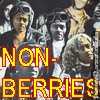
I am not talking about the multiple conflicts with U.S. laws Berry ran into during his lifetime. No, Chuck Berry may â at least indirectly â have an impact on future U.S. copyright laws.
Timothy J. McFarlin, a researcher and professor at the Saint Louis-based universities Washington and Fontbonne, was so kind to send me a preprint of a paper discussing necessary changes to the legal aspects of songwriting and recording (as well as creative work in general). The full 95-page text is to appear under the title "Father(s?) of Rock & Roll: Why the Johnnie Johnson v. Chuck Berry Songwriting Suit Should Change the Way Copyright Law Determines Joint Authorship" next year in the Vanderbilt Journal of Entertainment & Technology Law. You can read it right now from the Social Science Research Network at http://ssrn.com/abstract=2530741.
Tim McFarlin discusses a special detail in U.S. copyright laws, namely how current law determines what is called "joint authorship". This is a question which arises when two or more people contributed to a common work such as a song. Usually when two composers worked together to create a song, they own a shared copyright and are listed both. Typical examples are Lennon-McCartney or Leiber-Stoller.
Composers who work together usually have some kind of contract or agreement on how to claim copyright of the resulting works. If they donât or if one of them questions the agreement, a judge or jury needs to decide who wrote the piece and who owns the copyright.
Now what has Chuck Berry to do with this? Berry was the defendant in a well-documented lawsuit which basically revolved around this exact question.
In 2000 Berryâs long-time pianist Johnnie Johnson filed a suit against Chuck Berry claiming that he, Johnson, co-wrote 42 songs published under Chuck Berryâs name in the 1950âs and early 1960âs. This would have entitled him to both be listed as a co-author and to gain half of the financial success these songs created â which Johnsonâs lawyers estimated to an amount of at least $6.2 million.
Johnson lost the case in the end. It was never determined whether or not he co-wrote the songs and whether he could qualify as a co-writer. The court ultimately ruled that the statute of limitations had expired, meaning that Johnson was required to have filed his claims no later than three years after he knew or should have known that Berry was claiming sole authorship of the songs.
Because this expiration was unclear first â Johnsonâs lawyers claimed that he was tricked into believing that he had no rights to the songs â the parties to the case concurrently investigated how these songs were created and whether Johnson qualified as a co-author at all. To do so, they let Berry and Johnson explain how they worked in the 1950âs and early 1960âs.
On June 19-20, 2002, Johnnie Johnson was interviewed under oath in a deposition by Chuck Berryâs lawyers. Berryâs deposition by Johnsonâs lawyers took place two months later on August 21-22, 2002. These resulted in over six hundred pages of transcript which are now for the first time used for scientific research. Tim McFarlin cites a lot from these protocols which therefore makes his paper an interesting read even if you donât care about the legal aspects.
If I understand Timâs ideas correctly, he complains that in current U.S. copyright law one of the main arguments whether or not a contributor is a co-author (and an argument which courts test against) is that the contributor (or both) regards himself as an author. And the contribution must have been copyrightable by itself.
Both requirements do not fit to what we see in the collaboration between Berry and Johnson â or any other contributors to recorded music. The copyright laws assume that a sole author (or a team) in advance prepare a copyrightable work. This might happen in song recordings if you look at a big band or orchestra where a composer or arranger clearly writes down the notes each instrument is to contribute at a given time.
This however is not how a 1950âs recording of a Rock ânâ Roll band worked. From the testimonials quoted here we understand that Berry basically wrote down the lyrics. Probably he also had in mind or on paper the melody he would sing these words to â and maybe even his guitar accompaniment. But Berry might have in mind but not in writing what for instance the drummer or the bass player should contribute. He just let the musicians do their best â which is what he selected them for.
Thus if a musician came up with letâs say a significant bass line or a great piano solo, this hasnât been part of Berryâs original composition â and thus his copyrightable work. We know of several Berry recordings where Johnnie Johnson provided more than just a standard blues or boogie accompaniment to the songs. A nice example to me is You Never Can Tell, where the piano almost provides a second voice.
As Tim McFarlin points out, even if Johnson was the author of these contributions and even if those would provide a significant element of the copyrighted work, Johnson would still not qualify as a joint author because his work would not pass the typical tests. Please read Timâs paper to understand the legal arguments. Basically Johnson never intended to be a co-author and thus he couldnât become one.
This is a bit different from the understanding of authorship in other countries, such as here in Germany. Here you do not have to intend to be an author. Simply by the act of writing (or composing) you create a work and then you own the copyright in it. This is much simpler than in the U.S., but might result in similar problems for a judge to decide whether a contribution is worth a share in the copyright.
Tim McFarlin comes to a similar result by proposing a new test for joint authorship which does not rely on the intention to become an author but on the intention to jointly create a work. In this example musicians came together to jointly contribute to the creation of a song (at least if Johnsonâs testimony is to be believed) or at the very least to jointly contribute to the recording of the song, so all of the substantial contributors to the song (Tim details how he thinks âsubstantialâ should be determined) should qualify as its co-authors, just as all substantial contributors to the recordings should qualify as its co-authors. (Under U.S. law, a song and an audio recording of that song are separately copyrightable, but here Johnson only sued for credit as co-author of the songs, probably because the copyrights in the recordings were unambiguously owned â at least originally â by Chess under recording contracts that Chess had with Berry and the rest of the band.) Because McFarlinâs test stems from evaluation of the Johnson v. Berry case, Tim names it the "Berry-Johnson" test. One might see this as an honor for Chuck Berry â or probably not.
For readers of this blog the most interesting elements of Timâs paper are his quotes from the sworn testimony of Johnson and Berry. These provide a quite open look at how recording went during the old days at Chess studios. Here are a few quotes cited in Timâs article. As these are taken from oral questions and answers, punctuation and grammar are quoted as in the protocols.
Johnnie Johnson on work at Berryâs home in Whittier:
[W]hen we first started, he didnât have a studio, we were mostly running over these songs at his house, and then after awhile [sic] he got this studio on Easton, and thatâs where we did most of the work at.
Johnnie Johnson on Leonard Chessâ contributions:
Most all of them was in final form, at least we thought they were in final form, until maybe Leonard Chess would suggest something we did. [H]e would take the tape that we took him, he would listen to it and he would suggest something that he maybe thought could be improved, he would make a statement about it and we would maybe try what he thought would improve it; if it did, that would go on the record; if not, we would leave it as is.
Johnnie Johnson about whether drummers Jasper Thomas or Ebbie Hardy should be considered as among the composers of these songs:
No. Because theyâre not playing music, theyâre just keeping time.
Chuck Berry trying to explain to a lawyer that a song is not complete until on record:
[T]here was no Wee Wee Hours before, there was no music to Wee Wee Hours before Wee Wee Hours was Wee Wee Hours. Wee Wee Hours became Wee Wee Hours after we had recorded it, it was named Wee Wee Hours. We physically put it on the record. The name, the title Wee Wee Hours became the title of Wee Wee Hours before Wee Wee Hours.
Chuck Berry still trying to explain the same thing:
I could change this to all of these songs were created [in the session], because a song is not, to me, is not a song until itâs confirmed, itâs confirmed in the session when we say, okay, this is this song, if it bears the same title that we brought up. [I]tâs not that song until itâs there. [A]ll the other things were rejected and they became no song until the final song. [I]t isnât that song until after itâs named that song and then put down on a record and came out that way.
Chuck Berry about the complexity of songs such as Wee Wee Hours:
Well, I think that Wee Wee Hours, itâs so simple, I think I showed him [Johnson] what to play. I could have played it, because itâs simple, itâs very simple, and what I played with my left hand is progression, and any person would follow with that same thing if they heard the top.
Chuck Berry about his own songs:
My songs are, my own songs rather than copying Route 66 or a Nat Cole song, theyâre so simple that you can play one song and sing the lyrics to another song.
Chuck Berry about the early Chess recordings:
Iâm trying to think if we ever did any rehearsing at the Cosmopolitan, and thatâs about the only place that we would have, because most of these songs I created actually in the session, we might have played songs like it, like Roll Over Beethoven is about the same progression as Johnny B. Goode, or Carol. Rock and roll is so simple that you can hardly distinguish any specifics about either song.
Chuck Berry about his understanding with Johnnie Johnson:
[T]here was a harmonious understanding after a few recordings, that when I stop singing, Johnnie played this riff, or that riff, and there are certain ones that I can name. I could implicate the rhythm and he would remember the thing that I liked so much, and the same thing would happen, turned around, when I would play the riff, that Iâd ask him to play a certain thing, seemed like to me, he would just fall in.
Chuck Berry on how his songs were created:
Mostly [] all of my songs [] began with what I strum with the guitar, just a strum, chord for chord for chord as the changes go, and along with the lyrics that Iâm singing with it, so this is a good progression, I mean, manner in which a song travels in changing chords and so forth. Iâm singing the melody along with this, and as I introduced the songs to the musicians at a session or wherever it is, a jam session behind any auditorium, I will play that and sing that, you know, they get an idea of how the song progresses.
Chuck Berry on originality and copyrights:
I believe there is nothing under the sun that hasnât been played, and now, with the years that I have, there is nothing, there is no riff under the sun that Johnnie has not heard or I have not heard; so, you play, it might come out and it belongs to someone else, you take the chance that it doesnât, and you go ahead and you record it; [] if it sounds good and meets what you wanted on the song or is equal to what you wanted in the song, let it go, itâs a song, you donât know whether it will be a hit or not, so it goes, and nobody is writing it down saying âI own thisâ, and âI own thisâ, or âThis will be good for the song as a copyrightâ, or anything, nobody knows that until after the song is played out there in the world.
Chuck Berry on what makes a song:
You know, since I consider the lyrics, some of the lyrics in my songs is the whole song, especially like Johnny B. Goode, most of my songs are just boogie, but lyrics, I guess, carried them through, No Money Down, Roll Over Beethoven, I know Beethoven had, but I think the lyrics of my songs kind of pushed them more so than the music, because Iâm playing just boogie-woogie, like Count Basie, Lionel Hampton, Tommy Dorsey, those are the people that drove me to playing, you know.
Chuck Berry on to what extent Leonard Chess decided what went on record:
His glory and my privilege, because I wanted to record. I had the inspiration that, I guess, any youngster would have, as long as you record me, Iâll do what you say, Iâll record anything, you know.
Chuck Berry on developing Roll Over Beethoven:
Roll Over Beethoven is a twelve-bar blues boogie, twelve-bar boogie blues, the music was not developed, it was just played boogie in C, and believe me, there is nothing different from playing boogie in C and hearing the lyrics to â what was the song you said? Roll Over Beethoven, Johnny B. Goode, you name it, all of the songs could carry the same background or music that each other has. So, how did the music develop? Johnnie played boogie in C, I sing the song, once my singing is a comparable and the music is in tone quality and volume, that song is made. [How about the guitar?] Well, the drum, too, for that matter, all of that has to coordinate, you know, with, what do you call it, favorable to the record owner, to the Chess Company, to Chess himself, if itâs favorable, if it sounds good, once we get it to sound good on one take, thatâs a song, thatâs what I mean.
The basic question of whether Johnnie Johnson should have been granted a partial copyright on some Chuck Berry songs remains open. The court did not decide. Johnson supporters such as George Turek and his stepson Travis Fitzpatrick will probably have no doubt. They also had Johnson trademark the line "Father of Rock & Roll" which, as Berry is also often called the Father of Rock & Roll, led Tim McFarlin to the title of his paper: "Father(s?) of Rock & Roll".
My personal opinion is that Johnson for the most part of Berryâs songbook did provide a great underlying piano foundation, though not necessarily more than any other good pianist could have provided as well. Therefore for all of the great hits I agree with Chuck Berry in that the lyrics and the melody make the song. This is what would end up in sheet music, and this is what should be regarded as copyrightable. The Johnson v. Berry case did not give us a definite answer whether Berry wrote the melodies of his major hits all alone, or along with Johnson, or with someone else.
Setting the big hits aside, there are several Chuck Berry recordings for which Berry has been listed and registered as the sole composer â often many years later â in which Johnson plays a major, if not the major role. Have a listen to the recently discovered Fast B6. This is a pure piano piece and nobody should say that this is a Chuck Berry composition. Or, to take one song which was recorded in the 1950âs but interestingly not disputed in the trial, listen to Blue Feeling. This is a song which should have been credited at least to Berry-Johnson, if not Johnson alone. However, since Johnson died in 2005, all that is left on the subject is current and future scientific research.
One more sidenote: From Tim McFarlinâs paper we also learn the correct spelling of Ebbie Hardyâs name. Drummer of the original Johnson/Berry band, Hardyâs first name has been spelled Eddy and Ebby in former publications. Tim got the correct spelling from Ebbieâs grandson.
Tuesday, December 9. 2014
Chuck Berry On Stage - The Sticker Version of CHESS LP 1480
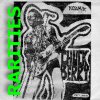
This blog article is a true collaboration between Morten Reff and me. Here are the results of our joint research on Chuck Berry On Stage, the original CHESS album from 1963.
When Morten described Berry's seventh CHESS album on page 60 in his Chuck Berry International Directory, Volume 1, he noted:
The original pressings of this LP had a sticker on the front cover saying 'Including "MEMPHIS" & "SURFIN' USA".As you know, all later variants of this album had this text printed directly on the cover, using a different font style and color. (Look at the end of this article if you don't remember.)
So when in August I found an eBay offer of a copy having the title sticker, Morten did not hesitate to buy it - even though it was quite expensive.
This finally allows us to show an image of the original cover of CHESS LP 1480. (Click for a higher resolution image.)
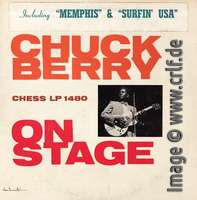
A contemporary ad from Chess showed a black and white image of the sticker version of the album. And the sticker seems to be applied hastily just before the photo shooting as crooked as it is.
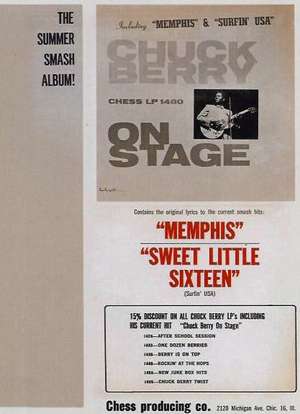
Though now having this extremely rare variant opens another set of questions:
When receiving the album, Morten found
"The copy I bought features the second label, the black label (repress) image on page 60."So how does a later vinyl make it into the original first sleeve? Two answers are likely: Between 1963 and 2014 someone might have replaced the original vinyl with a repressing, given the original record being defect or broken. Or, as Morten knows, CHESS usually pressed more covers than vinyl albums, so what they had available were used. Thus in the factory someone might have taken an old original cover from the box at the bottom of the stack when packing the newly pressed albums.
We can only speculate on this. But what is even more interesting to know is: "Have there been sold any copies of this album which neither have the printed text nor the sticker?"
We won't remove the sticker from this valuable album, but we both expect it to have no printing under the sticker. So we think the very first printings of the cover did not include any reference to Memphis or Surfin' USA. What we now found, might indeed not be the very first variant of this cover. It might already be a second variant, 'enhanced' with the title sticker.
So our question to all Berry collectors reading this blog is: Do you have a copy of CHESS LP 1480 which has no sticker and no printing of the 'including' text? If you do, send us an image and we would be happy to show it here.
During this discussion, we also found that while neither this site nor Morten's book could have shown the sticker variant of the cover, we also failed to show the correct non-sticker variant. On my site I had a later French reissue (which was then also pirated to Wikipedia), Morten's publisher included by accident the British Pye version.
The correct second (or third) cover variant has the label name and number prominently right next to the photo as it can be seen here. Sorry for that. So here's what should have been in the book and on the site.
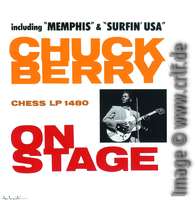
Thursday, November 20. 2014
CBID - Japanese Promo Sampler containing unusual Mercury recordings

CBID is never complete as new records and CDs appear and some old rarities are discovered. This section presents interesting additions and corrections to CBID.
Today: How Philips promoted Japanese Mercury singles. Add this to the Japan discography published in Volume 1:
JAPAN
St. Louie To Frisco / Soul Rockin'
Mercury SM-1061 ? 1968
This has a great picture sleeve, very similar to the 1968 US LP cover of FROM ST.LOUIE TO FRISCO [Âľercury SR-61176]. Blue label with silver lettering.
Addition: As a promotional record to DJs and journalists, the contents of this and other singles from Philips Nippon labels was sent out in advance on a various artists album (see Philips DFM-97 below).
(Title in Japanese only)
Philips DFM-97 ? January 1969
St. Louie To Frisco / Soul Rockin'
Promotional LP album issued by Philips Nippon Group containing the A and B sides of newly released singles by various artists and labels. Besides the two songs from Mercury SM-1061 the album includes recordings by The Herd, The Swingle Singers, Tommy James & The Shondells, Gary Walker & The Rain (one song only), Jerry Butler, and The Mauds. Generic picture cover with artist photos, no Chuck. Cue sheet with singles details glued on back cover.
Sunday, November 16. 2014
The hidden gems in Bear Family's new 16-CD box
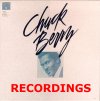
Bear Family's original marketing material for Chuck Berry: Rock And Roll Music â Any Old Way You Choose It (Bear Family BCD 17273 PL) promised "all of Berry's studio recordings for Chess, Mercury, and Atco plus a selection of live performances." If you're a die-hard Berry fan or collector you probably already have all the relevant releases and that means all the studio recordings and all the live recordings. Thus except for the beautiful books, is there any reason for you to spend $400/âŹ300 for this box?
There is! The reason is that every single one of the 16 CDs comes with at least one hidden gem which you might want to have. Let's run through them:
CD 1
The first CD contains the studio recordings up until May 1957 including the two Joe Alexander tracks.
The hidden gem is La Juanda (or Lajaunda as it was incorrectly named by Chess). As you know from this blog, there are two slightly different versions of this song. The two versions differ in the overdubbed second vocal track. On this CD 1 we get to hear the version which was originally used on the CHESS 1664 single - and only there. All later EPs, LPs, and CDs in contrast included the other variant. Thus the single version of La Juanda is included here for the first time on CD.
CD 2
The second CD contains all the Chess recordings made between December 1957 and September 1958.
The hidden gem here is Carol. If you compare this track to the well known and indefinitely repeated version which you hear on all other CDs it will come up as a true surprise. While we are used to Carol sounding dull and dark, it now sounds light and clear. Finally someone took the original recording and released it in full sound quality just as it was on the original Chess single.
CD 3
The third CD covers the Chess recordings between November 1958 and early 1960.
The hidden gem on this CD is indeed an unheard-of Chess recording. Titled Fast B6 this is another instrumental/jam/warm-up from the Chess session tapes. For the first time we hear this previously unreleased Chuck Berry recording - or should I better say Johnnie Johnson recording.
CD 4
The fourth CD completes the session which ended CD 3 and runs until August 1964.
It contains no less than three hidden gems. First you will find I'm In The Twilight Zone which had been available on a promotional-only CD before but was omitted from the Hip-O Select set You Never Can Tell - His Complete Chess Recordings 1960-1966 (HIP-O-Select B0012485-02).
Also missing from this set but on this CD - and for the first time on CD at all - are the shortened versions of the songs Chuck's Beat and Bo's Beat such as they were first released on the single Checker 1089.
CD 5
The fifth CD starts with a session of December 1964 and runs âtil the end of 1965.
There is no direct hidden gem on this CD but we will come back to it when talking about CD 11.
CD 6
The sixth CD covers the last session for Chess in April 1966 and continues with the Mercury sessions up to March 1967.
This CD not only contains the Mercury recordings which were on the original vinyl albums. It also includes all those additional songs which were not on the original releases but hidden on the 1980s re-releases. As those 1980s CDs have been extremely hard to find, the whole Mercury stuff is a reason to buy this box. And yes, in my opinion some of the Mercury recordings are gems indeed.
But besides that also this CD contains a hidden gem. The song Oh Captain was originally released on the album Mercury SR-61176 From St. Louie To Frisco. It always sounded strange as the two stereo channels were not in sync but offset for several seconds. This might have been by intention of artist or producer, though. Hey, it was hippie-era San Francisco where the album was finished. But it might also be just a technical fault which happened. There is no definitive answer, but Chuck Berry in an interview once complained about Mercury having destroyed his recordings.
Due to this, some Berry fan, said to be a Swedish sound engineer, had ârepairedâ the song by bringing the stereo channels back in sync. This repaired version has been floating around the Berry collectorsâ community for many years. CD 6 now comes with an "official" synchronized version of Oh Captain, engineered by Mark Kennedy. This version clearly sounds much better than the originally released mess â at least to our ears. It may not have sounded better to a 1968 SF sound engineer on dope, though.
CD 7
The seventh CD completes the March 1967 session, runs through the remaining Mercury sessions and even includes the first session back at Chess from November 1969.
Again there is a hidden gem on it. Plus a correction for those who own the 1989 CD release of Concerto In B Goode. If you do, you will welcome that there is now a track separator between Put Her Down and Concerto In B Goode. On the early and so far only CD reissue this track separator was forgotten so you couldnât access the 18 minute concerto.
But the true hidden gem is a version of Rock Cradle Rock we haven't heard before. The new version of this tune is not really an alternate recording but a different mix having some guitar solos added. This brings the originally very short (1:22 minute) song to at least 1:51 minutes and indeed makes it better.
CD 8
The eighth CD continues in November 1969 and includes the studio recordings up to February 1972.
The hidden gems on this CD are two edited versions which have been available before only on vinyl. Both Johnny B. Goode and Reelin' And Rockin' from the London Chuck Berry Sessions live album had been edited to fit on the singles they appeared on. While the full length versions have been re-released often, these two edits are available on CD here for the first time. In case you ask: the version of Reelin' And Rockin' is the edit for the US single Chess CH-2136.
CD 9
The ninth CD starts in February 1972 and continues until August 1974.
Collectors will immediately notice a song called You And My Country which had not been listed on the 2010 Hip-O Select set Have Mercy â His Complete Chess Recordings 1969 To 1974 (HIP-O-Select B0013790-02). However, the recording itself is on the Hip-O set, though called Me And My Country. That was an error because You And My Country is both the original title under which this song first became known when its lyrics were published in the songbook RockânâRoll Poet and it is what Berry sings about.
The hidden gem on CD 9 is an edited version again which was only available on vinyl up to now. Bio had been edited down half a minute to fit on the US single Chess CH-2140. CD 9 contains this edited version, while the unedited version is on CD 10.
CD 10
The tenth CD contains the remaining Chess studio sessions from August 1974. Plus.
I tried hard, but didn't find any hidden gem on this CD. It does include the full-length versions of three songs which were in edited form on CDs 4 and 9, though.
CD 11
The eleventh CD contains the 1979 studio recordings published on the Atco album Rockit SD 38-118, but starts with 14 Chess recordings from the early 1960s.
This includes various, significantly different stereo versions of well-known Chess songs. These had been published in the 1960s and 1980s. Also included are a few alternate takes - and two hidden gems.
The first hidden gem on CD 11 is the stereo version of Diploma For Two which had not been available on CD before. The second hidden gem is even more interesting. Jamaica Farewell on CD 11 is the version from the UK variant of the Chuck Berry In London album (Chess CRL-4005). This is a different recording/take from the one published in the US which is on CD 5. The differences are minor and except for the differing run time hard to spot, but this version is here for the first time on CD. It was even omitted from the Hip-O sets.
CD 12
The twelfth CD contains three Chuck Berry concerts from 1956, 1958, and 1963.
The whole 1963 show is a hidden gem as it was not heard before. From the discography we learn that Chess recorded four shows with Berry on October 25 and 26, 1963 at the Walled Lake Casino, Detroit. Only the two Saturday shows had been released on the Hip-O Select set You Never Can Tell - His Complete Chess Recordings 1960-1966 (HIP-O-Select B0012485-02) and even those incompletely. Here is the complete first show of Friday which was not on the Hip-O set.
CD 13
The thirteenth CD continues with the Walled Lake Casino recordings containing the complete second set of Friday and the complete two sets of Saturday. Of these three shows the first has not been available before. The other two were known for the most part, though both Memphis and the spoken introduction were omitted from the Hip-O release. Even though there are some duplicates when Berry played the same song in multiple shows, there are also some numbers such as Dust My Broom and Too Much Monkey Business which are not often heard in Berry concerts. With the two sets of Friday, October 25, 1963 we get some new and interesting stuff which had been unreleased so far.
CD 14
The fourteenth CD contains the 1967 recordings made in San Francisco and first released on Berry's first official live album Mercury MG-21138/SG-61138 Live At Fillmore Auditorium. When that album was re-released on CD in 1989, Mercury added five more songs from the shows. CD 14 of the Bear Family box contains the exact contents of that 1989 CD, i.e. the more complete recording. The only difference is that here the 8:36 minute medley which starts the show is logically divided into three individual tracks.
CD 15
Very well known is the chronologically next live recording from Toronto 1969 which takes up the full fifteenth CD. This concert has been re-released on albums and CDs dozens of times. There seems to be a complete tape of this concert somewhere as several of the cheap releases include spoken introductions, stage banter and reaction to audience input. CD 15 however includes the cut-off separated songs as they were originally released on the album Live In Concert by Magnum.
The hidden gem which was not heard on this and any other releases is a version of Goodnight, Sweetheart, Goodnight called Bonsoir Cherie which had been available before only on the video and DVD releases of this concert.
CD 16
The sixteenth and last CD of this set contains several live recordings from the 1970s plus one rare studio recording and some tracks which you can count as a live recording or a studio recording just as you want to.
From 1972 there is the concert from Coventry which was used for the second side of Chess album CH-60020 The London Chuck Berry Sessions. Three songs, Reelinâ And Rockinâ, My Ding-A-Ling, and Johnny B. Goode, were released both on this album and in heavily edited form on several Chess singles. A fourth song, Roll âEm Pete, was even overdubbed with additional instruments and released as the flip side of Chess single CH-2140. As said above, these edited versions can be found on CD 8 of this box, some for the first time on CD at all. The original long recordings are on this CD 16 along with four more songs from this show which were first released in 2010 on the Hip-O Select set Have Mercy â His Complete Chess Recordings 1969 To 1974.
The first hidden gems on CD 16 are two additional songs from the Coventry show plus a short instrumental and an introduction. All four tracks are released here for the first time.
In 1964 during his first tour in England, Berry and his backing band The Dominoes played some numbers at the BBC Studios for the BBC Saturday Club radio show. There was no audience, so you may argue if this is a live or studio recording, but who cares. Parts of this recording had been available before on a vinyl album Dominoes & King Size Taylor (excerpts only) and on a poor unofficial CD Chuck Berry In London (some tracks only and in lousy sound quality).
Thus the second hidden gem on CD 16 is that for the first time we hear the five songs complete and in very good quality. Interestingly some crackles suggest that these five songs have been transcribed from a vinyl recording, though one that wasnât available to the public.
The list of hidden gems continues with the last three tracks on CD 16. First you get the 1977 recording of Berry's version of the Dr Pepper advertising song along with the corresponding interview. Then again from 1977 there is the final live recording in this selection. This medley of Reelinâ And Rockinâ and Roll Over Beethoven was recorded for the motion picture American Hot Wax about Alan Freed and as such was released on the corresponding soundtrack album. All three tracks had been available on vinyl only and are here on CD for the first time.
Summary
Thus, is the 16 CD box worth its price even if you already have all of Berry's released recordings? Definitely!
Every single one of this 16 CDs contains some hidden gem. If you'd see a single CD offered at $20 which would contain only one of those hidden gems, wouldn't you buy it?
Here we get sixteen of these! We get most of the contents of the 12 Hip-O CDs. We get the complete contents of the five Mercury CDs, each of which alone easily sold for $50, if offered at all.
And as hidden gems we get:
- one song which was forgotten on the Hip-O sets
- twelve tracks which were available on vinyl only before
- three studio recordings which had not been available before at all, and
- twenty-five (!) live recordings - all unreleased until this great box arrived.
Wednesday, November 5. 2014
Seven Pounds of Berry

Chuck Berry: Rock And Roll Music â Any Old Way You Choose It
Bear Family BCD 17273 PL, 16 CDs, 350 pages in two books
Collectors of our kind of music already know: When Bear Family takes care of one of our favorite artists, you can purchase the result without any doubt, no matter if they cover Bill Haley, Jerry Lee Lewis, Carl Perkins, or as here Chuck Berry. So why write a review then? Because there are collectors who think more than twice when a box comes with a price tag of 300 Euros (or $400). So what do you get for the money?
One thing you will get is simply everything, no less than the total musical works of Chuck Berry. Just turned 88, this pioneer of rock music in the 1950s, 1960s, and 1970s worked for the labels Chess, Mercury, and Atco. During these times more than 300 studio recordings originated. And all of them are in this box.
The Chess recordings had been reissued in 2008 to 2010 by Hip-O Select, a sub-label of Universal Music. Likewise the Atco recordings are available on CD.
But here we also get the Mercury recordings (1966 to 1969). While there had been a CD reissue in the 1980s, those were pressed in very little quantity and are extremely hard to find. Which is a pity because also in the late 1960s Berry recorded several interesting songs. One highlight are the tracks recorded in Memphis together with a set of musicians who later performed with Elvis on numbers such as In The Ghetto or Suspicious Minds.
So we get Berry's complete studio work including his Mercury period. Which makes up for a total of 11 CDs. These CDs have been compiled in a way that every Rock'n'Roll fan may want to listen to an arbitrary one without getting bored. This is in contrast to the Hip-O Select sets which got lost in alternative takes presenting multiple versions of the same song in sequence often. With this Bear Family Box, there is only one version each, the most well-known variant. Only with a small selection you may find a second variant hidden on a different CD, e.g. where the hit version had been highly modified against the original album version.
In addition to the complete studio history of Berry, five further CDs show an interesting comparison: a cross section through his live performances of that time. This starts with segments from an Alan Freed show in 1956 and ends with the stage recordings made for the Alan-Freed-Memorial movie "American Hot Wax" in 1977. Included are several recordings which had been available before only on rarest vinyl or not at all.
Bear Family would not Bear Family, though, if these twenty hours of music weren't accompanied by writings at least as interesting. And therefore this box does not only come with one album-sized book, it comes with two!
The main book was written by three authors, each of whom having written one or more books on Chuck Berry already. Bruce Pegg not only tells Berry's story on more than 100 pages, he also describes the circumstances of recording sessions and the origins of the songs. Fred Rothwell, who also acted as a producer for this box, added more than 30 pages of discography listing in detail each and every recording, musician, and important release. Morten Reff as the second producer not only made sure that in this collection all those tracks are found which had been missing on CD before. He also opens his archive of international record covers for us.
Due to this you not only find all the US covers displayed, but also the most beautiful records from all over the world, ranging from South Africa to New Zealand - of course in full color and best quality. Next to these there are approximately 1.000 photos: views into the recording studios, performances world-wide, concert posters, advertisements and so on. Many of these photos can be seen here for the first time, or at least for the first time in this outstanding quality.
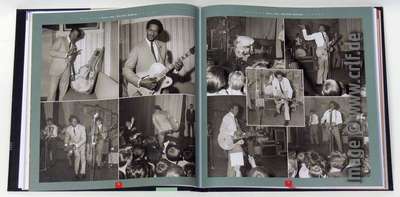
Chuck Berry at the Star-Club, Hamburg, June 1964
Which takes us to the second book from the box which tells of a sensational discovery: In 1996 journalist and blues expert Bill Greensmith gets a message from a friend regarding a photographic archive due to be dumped. In three rooms filled with hundreds of boxes Greensmith encounters some early Chuck Berry pictures. The house owner explains to him that the photographer, her husband Harry Davis, was a cousin of Berry. This was when Greensmith started to look through negative after negative.
His findings are astonishing: Not only had Davis shot Berry's wedding photo. He is also the originator of many of the early PR photos. Already in 1952 Davis takes first portraits of Berry with guitar and stage suit. Some shots from this or other early photo sessions were used by Chess for covers and songbooks even ten years later. Most of the photos have been unknown, though, until they are shown now within this box.
Whereas it doesn't stop with the publicity shots. Harry Davis and his camera also joined Berry at performances in St. Louis, e.g. in the Cosmopolitan Club. Thus on Harry's photos we see Chuck Berry and Johnnie Johnson on stage, several month before their first hit record.
The most interesting negatives, transparencies and prints Bill Greensmith restored and collected for this book. They are shown in large format, in astounding good quality, some even in color. This is a true gem, not only for Berry fans.
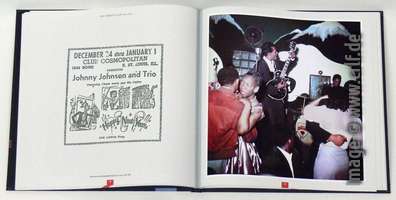
Chuck Berry at the Cosmopolitan Club, St. Louis, 1954
The text from the books and the uncounted stunning photos almost make for the price of the box by themselves. And in addition you get the bonus of Berry's total musical work on 16 CDs. Even if you think you already have everything by Berry, you will read or hear things yet unheard-of such as an insider's look into Berry's UK tour 1965, an advertising song for the Dr Pepper soft-drink, or the repaired version of a song once messed up during the original production.
As we know from Bear Family, there is very very little to object. Worth a discussion might be the strategy to include only the "most well-known" variant of a recording. With some songs one would prefer to also be able to listen to a different, sometimes even more original version. Where it couldn't be avoided, some tracks have been dubbed from vinyl records which you can hear sometimes. And for the 1969 concert having an uninterrupted audio track instead of separated songs would have been nice. All these are minor comments, though.
If you haven't been engaged in Chuck Berry's music much before, in this box you will find everything you will ever want to know about or hear from him - this is a complete collection. If instead you already have a lot of Berry material, you will still find many rarities and some first releases you don't have, not to miss the two incredibly good books you get with the box. Even if they cost 300 Euro (or $400): These seven pounds Chuck Berry are recommended unconditionally!
The box is right now available from Bear Family or from your favorite record seller. Here's a list of some links to compare prices.
Wednesday, October 29. 2014
Bear Family's 16-CD Box Set is out now

Chuck Berry: Rock And Roll Music had been planned to be released no later than Berry's 88th birthday on October 18th. However, problems with some suppliers caused a small delay.
Bear Family just told me that the boxes are shipping now. First copies to dealers went out on Monday, first copies to end users were shipped today. So expect your copy to arrive soon.
Those who ordered the more expensive Guitar Case Edition will have to be patient, though. Even though Bear Family ordered the guitar cases months ago, they are still waiting to get them. As of today, Bear Family expects the limited Guitar Case Edition to be shipped by the end of November.
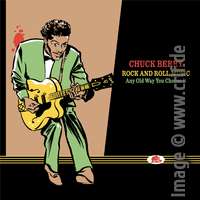
Sunday, October 26. 2014
Chuck Berry live from 1967 now on CD

These recordings have now been made available as a 2-CD set called Check Me Out! (Crying Steel CSR02). It includes all three concerts available at the Concert Vault:
- March 18, 1967 - Winterland, San Francisco
This confused me a bit at first, because in 2008 Wolfgang's Vault had this concert dated March 19, which would place it to the Fillmore Auditorium and not to the Winterland where Berry and the Grateful Dead played on March 17 and 18. For some reason, the date of this recording has changed, though the recording itself didn't. - December 26, 1967 - Winterland, San Francisco
This concert was not available when I first wrote about these recordings. I added some comments in a 2009 blog post. - December 29, 1967 - Winterland, San Francisco
a quite interesting concert with some very looong versions.
Anyway the 2-CD set is a nice professionally made item. And it even contains a recommendation for this site in its liner notes. Thanks!
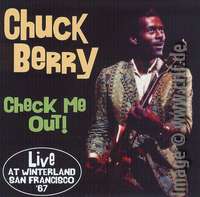
Saturday, October 18. 2014
CBID - Twin albums from France and Taiwan

CBID is never complete as new records and CDs appear and some old rarities are discovered. This section presents interesting additions and corrections to CBID.
Today: The probably ugliest Berry album cover has a more beautiful twin - and we show images of the Taiwanese album twins from pages 475 and 476 including some corrections. Add this to the country-specific discographies published in Volume 1:
FRANCE
CHUCK BERRY VOL. 2 (different cover)
Impact 6886 407 ? 1979
This is really the same album as the one on the bottom of page 309 (even the same cat.no.), but with a different cover, much better that is. I would assume that this was released in 1979. So far I have not seen Vol.1 (Impact 6886 403) of this â79 release. Images show the first variant (left) and the second (right).
TAIWAN
CHUCK BERRYâS GREATEST HITS (THE BEST OF CHUCK BERRY)
Chong Sheng CSJ-513 ? 1964
No Particular Place To Go / You Never Can Tell / Maybellene / Nadine / Brenda Lee / You Two / Rock And Roll Music / School Day / Sweet Little Sixteen / Brown Eyed Handsome Man / Too Much Monkey Business / Johnny B. Goode
Refering to page 475. The front cover is a copy of the original one with the yellow sticker proclaiming Featuring the original hits 'Memphis', 'Maybellene', 'Johnny B. Goode' - even though 'Memphis' is not actually included.
CHUCK BERRYâS GREATEST HITS (THE BEST OF CHUCK BERRY)
Hae Shan Records HS-295 ? 1970s
No Particular Place To Go / You Never Can Tell / Maybellene / Nadine / Brenda Lee / You Two / Memphis, Tennessee / Sweet Little Sixteen / Roll Over Beethoven / Rock And Roll Music / Johnny B. Goode / Brown Eyed Handsome Man
Refering to page 476. The correct label name is Hae Shan (and not Haishan) and this also came out on coloured vinyl, mine is orange. Cover says Greatest Hits, label says The Best Of.
Thursday, September 25. 2014
CBID - New Soundalikes

CBID is never complete as new records and CDs appear and some old rarities are discovered. This section presents interesting additions and corrections to CBID.
Today: a couple of interesting soundalikes to be added to the chapter on Chuck Berry soundalikes in Volume 4:
PETTER BAARLI (Norway)
See Backstreet Girls, Volume 3, page 1054, and Volume 4, page 1766 for biographical info.
Go Jimmy Go (Petter Baarli-Bjørn Nilsen) 2014
CD: You Petter B. Goode [Voices of Wonder VOW-175CD] ? Norway, 2014
Just the title of this album is reason enough to be included. However, the song itself is Berry on high speed. Among the thank youâs on the sleeve are Chuck and AC/DC. It should give you an idea of the content on the 15 tracks album.
POWDER BLUES (USA/Canada)
See Volume 3, page 1423 for biographical info.
Thirsty Ears (3:18) (Jack Lavin) 1979
45: Liberty/Capitol-EMI LT-1423 ? Canada, 1981
LP: Thirsty Ears [Liberty/Capitol-EMI LT-1105 ] ? Canada, 1981
CD: First Decade/Greatest Hits [WEA CD-71359] ? Canada, 1990
The song starts with that typical Johnny B. opening riff and almost sounds like a Berry song you havenât heard before, except thereâs a horn section in there.
The album reached platinum (200.000 copies) in the Summer of â81.
Note Their debut album âUncutâ (1979) features the studio version of âWhat Have I Been Drinkinââ but it doesnât have that Berry feeling to it which the live version from 1983 has (Volume 4, page 1866).
Sunday, September 7. 2014
The Bear Family Definition of 'COMPLETE'

In the meantime Bear Family added the boxset to their online catalog. You can now pre-order the set at the Bear Family Store.
They also included a complete, though little detailed track listing. This now gives us a first look at what is included in the box, and what is not. The contents is interesting, though a bit different from what I wrote earlier.
Bear Family has promised the COMPLETE studio recordings of Chuck Berry. However I find that my definition of "complete" differs a bit from theirs. Their definition of "complete" means that you will get EVERY song Berry ever recorded, but you will get just ONE version of every song.
This is in contrast to e.g. what Hip-O-Select had in mind with their three 4-CD boxes. If you look at Hip-O's first box, you'll find five different versions of Sweet Little Sixteen. As these variants often differ only slightly, listening to such a CD is boring for most. And if you have followed this blog closely, you know that even Hip-O missed to include some previously published tracks.
On the new Bear Family boxset there will be only ONE version of Sweet Little Sixteen plus the demo version. Thus you will not be bored by listening to eight variants of the same song. This is good. But you will need to buy additional CDs to complete your collection.
From the track listing it is a bit unclear which version we will hear. There is only one version of Sweet Little Sixteen, so it's probably the sped up hit single version. But there is also only one version of Merry Christmas Baby, which can either be the version used for the CHESS single, or the one used for the CHESS album. We will see. It seems that all the alternate or early takes are missing - at least unless they have been published under a different name before. So there's only one version of Betty Jean on the set, but there are three takes of Vacation Time: the single version plus the two alt. takes from America's Hottest Wax, known as 21 and 21 Blues. We will have to do some research once the boxset is available.
The sequence of the tracks on the 16 CDs is also a bit unclear. Basically it follows the recording dates, but the Joe Alexander takes are after How High The Moon. And between the Chuck Berry '75 album tracks and the ATCO tracks there are 18 CHESS tracks which were recorded in the 1960s. I expect the books to explain more about these recordings.
Bear Family's press release and order form also promise that with the Mercury and ATCO recordings "all surviving alternate takes" are included. From the track listing it seems that there is only one additional Mercury track and not a single alt. take from the ATCO sessions.
CDs 1 to 11 contain studio recordings, CDs 12 to 16 contain live recordings. Most of these are well-known such as the 1956 Alan Freed Show recordings. Included are some which were difficult to get before, such as the Newport recordings from 1958, the two songs from the American Hot Wax movie, or the BBC sessions with King Size Taylor & the Dominoes. Unheard before are two more shows from Detroit 1963 and a couple of additional recordings from Coventry 1972. From the Fillmore and from Toronto there seems to be just the well-known recordings.
Almost at the end of CD 16 you will find the 1977 Dr. Pepper promotion song. I did not see any other of the rare recordings from our Radio Show and Promotional Records section.
In total, the CD set seems to fulfill a bit less than what the PR promised. It will, however, contain several previously unreleased tracks and a lot of what has been very difficult to find up to now. Stay tuned: more when I learn more about this box ...
Saturday, September 6. 2014
CBID - Two Berry Cover Versions From Austria

CBID is never complete as new records and CDs appear and some old rarities are discovered. This section presents interesting additions and corrections to CBID.
Today: To be added to the chapter on Chuck Berry covers in Volume 3, two Austrian releases:
DE ICCO & The Stoolgang (Austria)
Singer Stefan De Icco led this funny named 50's revival Rock n' Roll band, also known as "De Icco & the Jailgang". Band members at that time were Dieter Libuda (gtr, who also produced and mixed this single), Peter Pansky (bs), Christian Deix (dms), Charlie Furthner (pno), and/or Oliver Jung (pno). Interestingly all of them became well-know Austrian musicians (see the links). Many thanks to studio owner Martin Unterweger for details about this group.
Nadine (3:27) 1991
45: STP Records STP-9111 ? Austria, 1991 (picture sleeve)
This is actually a very goode rockinâ version following the same beat as the original, but has accordion instead of sax and a slide-guitar solo. B-side is a country-rock performance of âRoute 66â, with a little bit of Berry/Stones.
MONALISA TWINS (Austria)
Twin sisters Mona and Lisa Wagner, 20 years of age, from Vienna, Austria, who have always been influenced by the â60s beat music and in the Beatles particularly. They are now living in Liverpool(!), England. They sing, play guitar and write much of their own stuff, in the â60s style.
Johnny B. Goode (3:01) 2013
CD: Play Beatles & More [Woolgoose Records 81004] ? Austria, 2013
They have beautiful voices and sing good but rockânâroll is not their style.
Thursday, September 4. 2014
The Polar Prize Ceremony celebrating Chuck Berry
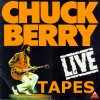
Next to his induction into the Rock And Roll Hall Of Fame, the Polar Music Prize is probably the most important award given to Chuck Berry for his lifetime role in creating most of modern rock music.
On Tuesday (August 26th, 2014), the prize ceremony took place in Stockholm, Sweden. Chuck Berry did not attend, neither on stage in Stockholm, nor by use of a video message. The official reason is that due to illness Berry is not able to travel. But not only Berry missed this important event. None of his family did attend either. We would have expected Charles Jr. or Ingrid to at least accept the prize on behalf of their dad. Instead someone choose British singer and producer Dave Edmunds to stand on stage, shake hands with the King of Sweden, and read a three-sentence letter from Berry. Even though Edmunds covered several Berry numbers such as Promised Land (1972) and Run Rudolph Run (1982), Edmunds is not necessarily my first choice for a Berry stand-in.
The video of the ceremony is not yet available at the Polar Music Prize website (www.polarmusicprize.org). However, in case you missed to watch it live, you can view the full ceremony as broadcast by Swedish TV4 from the TV station's website today and until Friday. So if you accept watching (too much) Swedish advertising, go ahead and have yourself an interesting hour.
The link to the broadcast is http://www.tv4play.se/program/polar-music-prize?video_id=2950197.
Do not be confused that the first segment containing interviews on the red carpet and a small film about the manufacturing of the prize statuette are in Swedish language. The full ceremony afterwards is in English!
You will be confused, though, at how easy the Swedish manage to mix Rock 'n' Roll music and classical music into a single program. It's kind of easy this year because the other winner, opera director Peter Sellars, is more of a "modern" classical artist, while Berry is more a "classical" modern artist. In mixing both styles, during the concert you'll see the full orchestra perform a number called "The Guitar Battle of Wartburg" which includes steel and electrical guitars.
There is not a single recent image or video snippet from Berry shown during the whole show. His biography and such is underlaid with segments from the "Hail! Hail! Rock 'n' Roll!" movie. Thus the most recent Chuck Berry is from 1986! While film makers from the committee were in St. Louis during a Berry show at Blueberry Hill, all they show is the announcement outside the doors plus a few sentences by Joe Edwards of Blueberry Hill and by Chuck's son Charles Jr. To me this looks as if there was some other problem besides Berry being ill.
Another video message shown during the ceremony is - as usual - by Keith Richards.
During the one-hour show several Berry numbers are performed, each by well-known Swedish artists from the 1960's 'til today. Some cover version are quite nice, others ... well ... judge yourself. You'll hear:
- Amanda Jenssen - Rock And Roll Music
- Jerry Williams - You Never Can Tell
- Maria Andersson (ex Sahara Hotnights) - Come On
- Nisse Hellberg (Wilmer X) - Little Queenie
- Kim Cesarion - No Particular Place To Go
- Kajsa Grytt (ex Tant Strul) - Memphis, Tennessee
- Dregen and Nicke Andersson (ex Hellacopters) - Johnny B. Goode
Main Page
This weblog is an addition to my Chuck Berry fansite called "A Collector's Guide to the Music of Chuck Berry" which describes all books and records of interest to everyone enjoying Chuck Berry's music.
Categories
What You Missed
Some earlier but important entries:
- Unanswered questions about the recording of Memphis, Tennessee
- Sweet Little Eight Variants of Sweet Little Sixteen
- The Johnny B. Goode Session
- Chuck Berry in Stereo
- Chuck Berry's Recording Session for Volkswagen
- Chuck Berry's Recording Session for Dr Pepper
- Tim McFarlin Introduces the Berry-Johnson Test into American Copyright Law
- Chuck Berry's Early Recording Locations
- Run! Rudolph, the Red-Nosed Reindeer â and the copyright mystery
- Chuck Berry live in New York 1956
- The very first Chuck Berry LP album
- The Chuck Berry On Stage (Chess LP-1480) confusion continues
- The Chuck Berry Vinyl Bootlegs, Vol. 1: Rare Berries
- Rocksmuk album - bootleg or not?
- 6034 cover versions of Chuck Berry songs
- Chuck Berry's Greatest Hits (Chess LP-1485) variants
Recent Entries
- CHUCK100 Tribute EP Series
- Thursday, January 16 2025
- CBID - Corrections, Additions, New Covers
- Friday, January 10 2025
- Rhythm and Rhyme - Chuck Berryâs poetic heartbeat
- Sunday, December 22 2024
- CBID - 6034 and counting ...
- Friday, November 1 2024
- CBID - 6034 cover versions of Chuck Berry songs
- Friday, July 5 2024
- CBID - The Never Ending Story - pt. 9
- Monday, June 10 2024
- CBID - The Never Ending Story - pt. 8
- Tuesday, June 4 2024
- CBID - The Never Ending Story - pt. 7
- Monday, April 22 2024
- Peter OâNeilâs So-Called Disorder
- Friday, April 12 2024
- The Chuck Berry Sound according to Atomicat
- Wednesday, April 10 2024
- CBID - The Never Ending Story - pt. 6
- Wednesday, April 3 2024
- CBID - The Never Ending Story - pt. 5
- Saturday, March 16 2024
- CBID - The Never Ending Story - pt. 4
- Monday, February 19 2024
- CBID - The Never Ending Story - pt. 3
- Monday, February 5 2024
- CBID - The Never Ending Story - pt. 2
- Monday, January 22 2024
- The Chuck Berry Vinyl Bootlegs, Vol. 3: America's Hottest Wax
- Tuesday, January 16 2024
- Chuck Berry in Fake Stereo
- Friday, January 12 2024
- CBID - The Never Ending Story
- Thursday, January 11 2024
- CBID - 5639 cover versions of Chuck Berry songs
- Tuesday, October 31 2023
- CBID - Covers, Chart Listings, and Not-Covers
- Monday, August 28 2023
- CBID - And they play Chuck Berry music - final part 10
- Monday, March 27 2023
- Little Queenie overdubs
- Monday, March 13 2023
- CBID - And they play Chuck Berry music - part 9
- Saturday, March 4 2023
- Lonely School Days - the variants explained
- Tuesday, January 31 2023
- An Interview with Johnnie Johnson - 1987
- Sunday, January 29 2023
Search
Copyright and Disclaimer
© Dietmar Rudolph
No part of this document may be used or published without written consent by the author.
Impressum/Haftungsausschluss/Datenschutz/Disclaimer
To contact the authors, email to cbguide@crlf.de.
